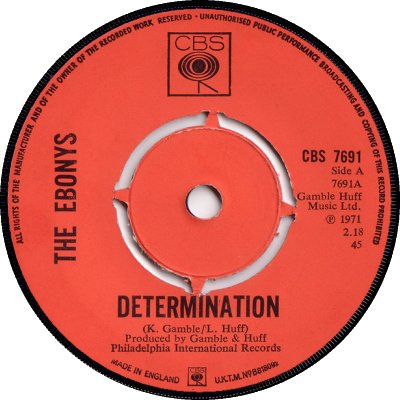
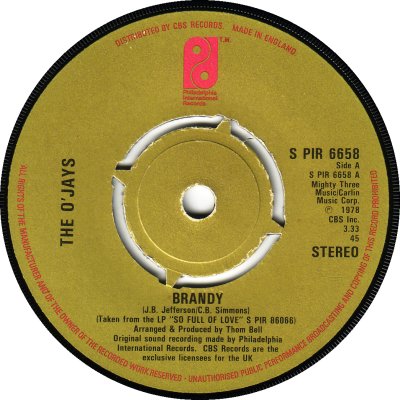
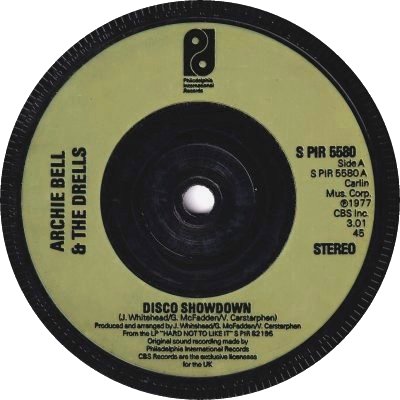
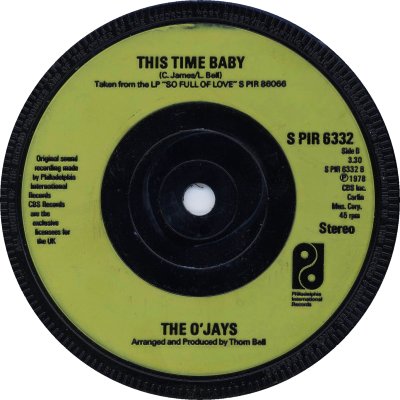
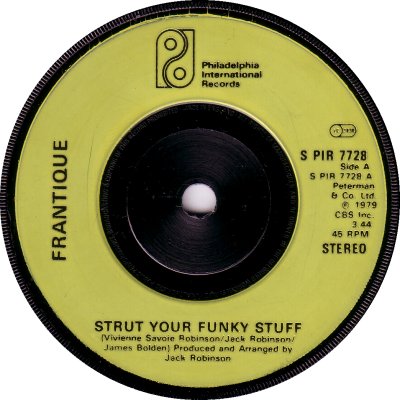
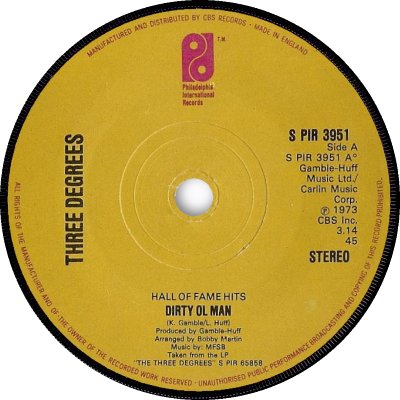
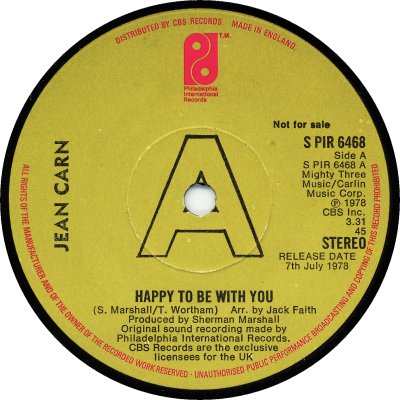
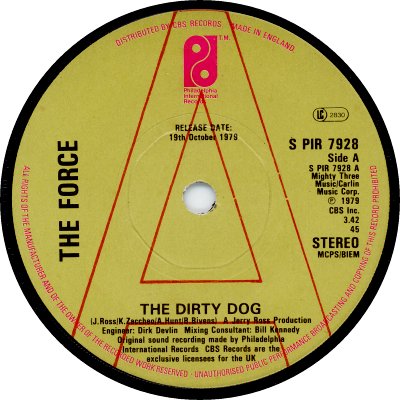
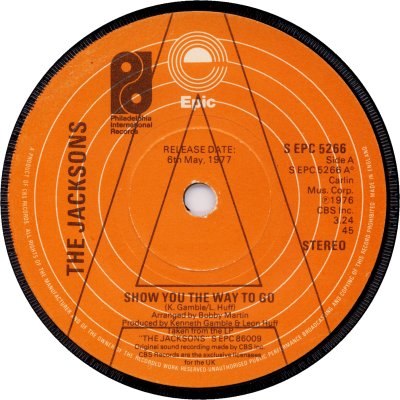
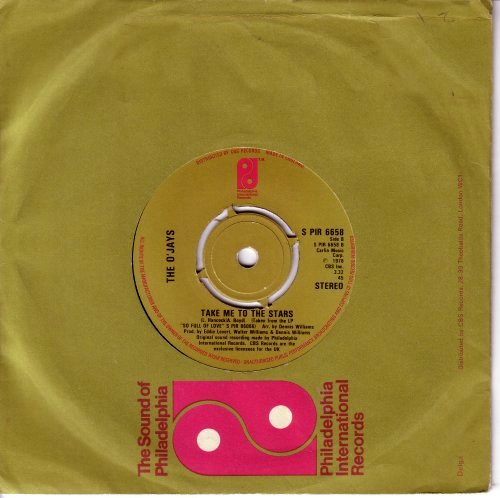
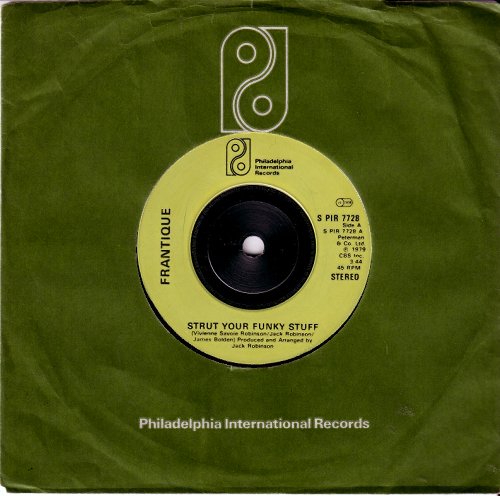
American; out of Philadelphia, unsurprisingly. Philadelphia International was started by songwriters and producers Kenny Gamble and Leon Huff in 1971. The pair had run other record labels previously. Their first, the short-lived Excel, was replaced by the longer-lived and more successful Gamble in 1966, and Neptune joined Gamble in the summer of 1969. In 1970 Columbia Records were looking to make more of an impact in the R&B market, and the head of the company Clive Davis turned to Gamble and Huff, offering them a start-up deal. The opportunity to join forces with a organization such as Columbia, with all its marketing and practical know-how, was too good to miss, and a deal was duly signed. 'Billboard' of the 30th of January 1971 reported that Columbia had picked up the rights to the Neptune label, bringing on board artists such as Billy Paul, The Intruders and the O'Jays. The 'Soul Slices' column of that particular issue was impressed, and reckoned that with the acquisition Columbia was 'Moving into Atlantic's neighborhood'. With the new start came a new name, Gamble being replaced by the slicker and grander-sounding Philadelphia International.
Gamble and Huff had ambitions for their new label. 'BB' of the 14th of October 1972 said that they had plans to broaden the range of musical styles that it covered, to include Jazz and Pop. More significantly, as it turned out, they aimed to develop a distinct 'Philadelphia sound' which would be a consistent feature of their recordings. They succeeded admirably in that aim, and the resultant 'Philly Sound', with its combination of funky rhythms, horns and lush strings proved hugely successful in the first half of the '70s. The pace dropped over the second half of the decade. 'BB' of the 16th of October broke the news that the label's roster of artists was being trimmed, acts with low sales potential being shown the door. In addition three of the label's executives had left and there were rumours that Gamble and Huff were considering selling the company to CBS. The rumours were scotched in the following week's issue, which carried a rebuttal from CBS saying that there had been no discussions and no negotiations, and pointing out that Philadelphia International had renewed its distribution agreement with CBS earlier that year.
The turn of the decade brought renewed speculation. 'BB' of the 10th of March 1979 told its readers that other companies including MCA were attempting to 'lure' Philadelphia International away from CBS, but nothing came of that. Some reorganizations and restructurings were carried out in the early '80s: 'BB' of the 5th of July 1980 reported that the TSOP label was being revived in an effort to create a new identity that would function separately from that of Philadelphia International itself, with some of the company's artists being transferred across - TSOP had been launched in 1974 but had been absorbed into the main label a couple of years later. Then in the summer of 1981 'BB' of the 4th of July noted that the company was likely to undergo restructuring, with Gamble taking care of production and Huff running the company. Additionally efforts would be concentrated on three primary acts - there had been discontent among the artists, with some wanting to leave.
Matters came to a head in 1982. After being president for less than a year, Harry Coombes - who had been with the company for ten years in various positions - left to start his own independent promotions / consultancy firm ('BB' 29th May). Then in a list of Top Black Music Companies given by 'BB' of the 5th of June, it could be seen that Philadelphia International had sunk from 11th to 18th. A week later there were denials that the company was going out of business. There was to be a further reorganization, and eleven staff had been laid off, including songwriters. There were whispers of possible friction between Huff and Gamble, with Huff wanting to be more involved in the business side. On top of that the label's best-selling artist, Teddy Pendergrass, was hospitalized and his future as a performer was in doubt ('BB', 12th June). Finally, towards the end of the year, Philadelphia International's distribution deal with CBS lapsed ('BB', 6th November). CBS did however retain the rights to the company's back-catalogue. Happily all was not lost. Philadelphia International kept going in a lesser way throughout the '80s and into the '90s, having formed links with EMI / Capitol. Then 1996 saw a revival, and a 'much anticipated' return to activity for Gamble and Huff ('BB', 3rd of August).
In Britain, Philadelphia International was less consistently successful than it was in its native land, but it still enjoyed an enviable number of Singles Chart hits. Billy Paul, Harold Melvin & The Blue Notes, the O'Jays and The Three Degrees were all familiar names in the Top 50 listings, though Top 10 placings were infrequent - Harold Melvin and his men managed two, as did The Three Degrees, while the O'Jays managed one. It was The Three Degrees who gave the label its sole No.1, in the shape of 'When Will I See You Again' b/w 'I Didn't Know' (PIR-2155; 6/74). From 1977 till the end of 1980 there were still a decent number of hits, but with the exception of 'Ain't No Stoppin' Us Now' b/w 'I Got The Love' by McFadden & Whitehead (PIR-7365; 5/79), which got to the No.5 spot, a No.10 by Frantique ('Strut Your Funky Stuff - Parts 1 & 2', PIR-7728; 7/79) and a No.12 from the O'Jays ('Use Ta Be My Girl' b/w 'This Time Baby', PIR-6332; 5/78), they failed to climb into the Top 20.
Initially Philadelphia International recordings came out on the CBS or Epic labels in this country. Early singles had a credit to the company on them (1), later ones just credited Gamble & Huff as producers. In the autumn of 1973, however, the company took steps towards having its own label. 'Music Week' of the 22nd of September said that it had signed a distribution deal with CBS, rather than a licensing one, and a couple of months or so later 'BB' of the 3rd of November revealed that Philadelphia International was to be given its own label identity here. The first two Philadelphia International singles duly appeared, on the 2nd of November, and 'The Love I Lost (Parts 1 & 2)' By Harold Melvin & The Blue Notes (PIR-1879; 11/73) got things off to a good start, only just failing to make the Top 20. The company's singles shared the main CBS numerical series, which accounts for the huge gaps in the numbers, but had their own 'PIR' prefix.
One label design served throughout. Labels were generally paper (2) but in 1977 CBS began experimenting with injection moulding, and as a result some popular singles can be found with both kinds of label. The first injection moulded label had the Philadelphia name and logo at the top, in the same style as the paper ones (3); from December 1977 the logo moved to 4 o'clock (4). It returned to the top in 1979, but the name increased in size and moved to the side (5). Couplings of successful sides which were included in CBS's 'Hall Of Fame Hits' series were marked accordingly (6); ones in the 'Disc-O-Doubles' and 'Golden Decade 1967-76' series came in the appropriate sleeves but had no special label markings. Promos were marked in the usual CBS fashion of the times (7, 8), and quite a few singles were given special promo-only pressings for DJ purposes, as can be seen below. The company's logo can be found on a few Epic label records by The Jacksons (9); these were the fruit of a production deal between Epic and Gamble & Huff, and they appeared on a joint 'Epic / Philadelphia International' label in the USA. The first company sleeve, which was used with minor variations in the cut until the summer of 1978, is pictured correctly with the opening at the top. The discography below only covers the 1970s. Thanks to Roger Foster for discographical input.
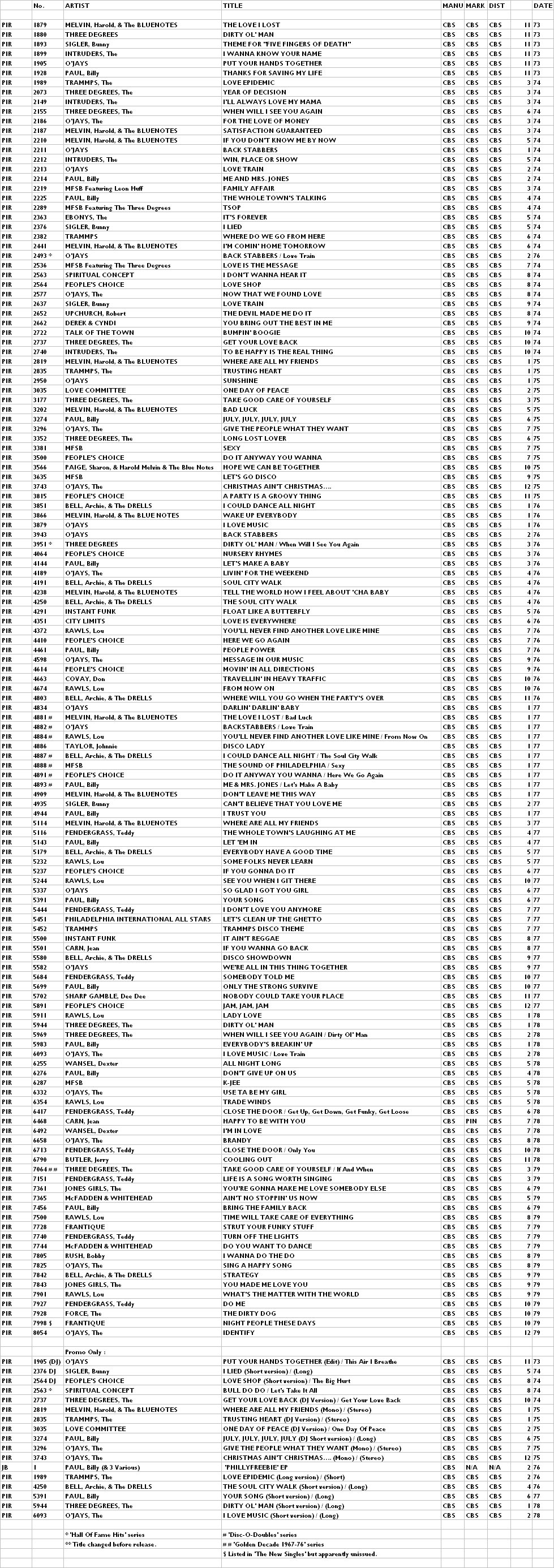


Copyright 2006 Robert Lyons.

